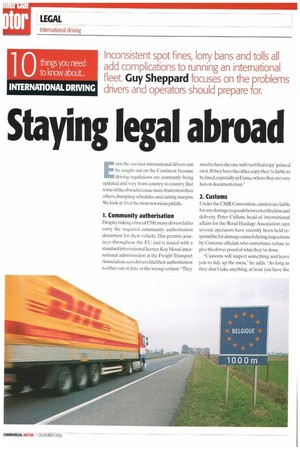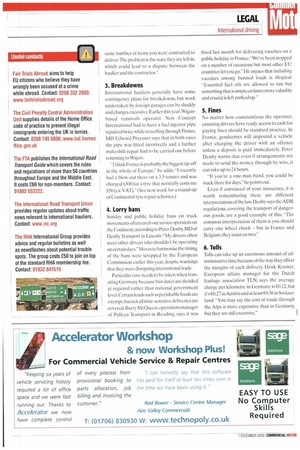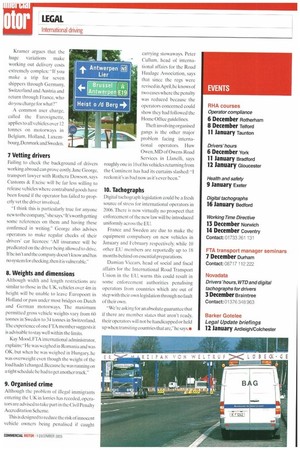10 things you need
Page 36

Page 37

Page 38

If you've noticed an error in this article please click here to report it so we can fix it.
to know about..
INTERNATIONAL DRIVING
Inconsistent spot fines, lorry bans and tolls all add complications to running an international
fleet Guy Sheppard focuses on the problems
drivers and operators should prepare for.
Staying legal abroad
!pin yen the savviest international drivers can Lbe caught out on the Continent because driving regulations are constantly being updated and vary from country to country. But some of the obstacles cause more frustration than others, disrupting schedules and cutting margins We look at 10 of the most notorious pitfalls.
1. Community authorisation Despiie risking a line ot E.700,nm \ drivers tail to carry the required communit) authorisation document for their vehicle. This permits journeys throughout the EU and is issued with a standard international licence. Kay Mood. international administrator at the Freight Transport Association, says drivers find their authorisation is either out of date or the wrong version: "They need to have the one with 'certified copyprinted on it. If they have the office copy they're liable to be fined, especially in France where they are very hot on documentation."
2. Customs Under the ('MR Convention, carriers are liable for any dam a.ge to goods between collection and delivery. Peter Cullum. head of international affairs for the Road Haulage Association, says several operators have recently been held responsible for damage caused during inspections by Customs officials who sometimes refuse to give the driver proof of what they've done.
"Customs will inspect something and leave you to tidy up the mess," he adds. "As long as they don't take anything. at least you have the same number of items you were contracted to deliver.The problem is the state they are left in, which could lead to a dispute between the haulier and the contractor."
3. Breakdowns
International hauliers generally have some contingency plans for breakdowns, but work undertaken by foreign garages can he shoddy and charges excessive. Earlier this year.Wiga nbased removals operator New Concept International had to have a fuel injector pipe repaired twice while travelling through France. MD Edward Preyzner says that in both cases the pipe was fitted incorrectly and a further makeshift repair had to be carried out before returning to Wigan.
"I think France is probably the biggest rip-off in the whole of Europe," he adds. "I recently had a blow-out there on a 3.5-tonner and was charged OW for a tyre that normally costs me £56 (ex-VAT)." (See next week for a round-up of Continental tyre repair schemes.)
4. Lorry bans
Sunday and public holiday bans on truck movements often catch out novice operators on the Con tine nt.according to Peter Denbv.MD of Denby Transport in Lincoln: "My drivers often meet other drivers who shouldn't be operating on certain days." Moves to hamionise the timing of the bans were scrapped by the European Commission earlier this year. despite warnings that they were disrupting international trade.
Particular care needs to be taken when transiting Germany because ban dates are decided at regional rather than national government level.Cerutin loads such as perishable foods are exempt, hut not all time-sensitive deliveries are covered. Barry McQueen,operations manager of Pulleyn Transport in Reading. says it was
fined last month for delivering vaccines on a public holiday in France:"We've been stopped on a number of occasions but most other EU countries let you go." He argues that including vaccines among banned loads is illogical: "Essential fuel oils are allowed to run hut something that is umpteen times more valuable and crucial is left parked up."
5. Fines
No matter how conscientious the operator. ensuring drivers have ready access to cash for paying fines should he standard practice. In France. gendarmes will impound a vehicle after charging the driver with an offence unless a deposit is paid immediately. Peter Denby warns that even if arrangements are made to send the money through by wire, it can take up to 24 hours.
if you're a one-man band, you could he stuck there for days," he points out.
Even if convinced of your innocence, it is worth remembering there are different interpretations of the law. Denby says the ADR regulations. covering the transport of dangerous goods, are a good example of this: "The common interpretation of them is you should carry one wheel chock but in France and Belgium. they insist on two."
6. Tolls
Tolls can take up an enormous amount of administrative time because of the way they affect the margins of each delivery. I lenk Kramer, European affairs manager for the Dutch haulage association TEN, says the average charge per kilometre in Germany is €0.12, but it's €0.27 in Austria and at least €.0.56 in Switzerland: "You may say the cost of roads through the Alps is more expensive than in Germany. but they are still excessive."
Kramer argues that the
huge variations make working out delivery costs extremely complex: -If you make a trip for seven shippers through Germany. Switzerland and Austria and return through France. who do you charge for what?"
A common user charge, called the Eurovignette, applies to all vehicles over 12 tonnes on motorways in Belgium. Holland. Luxem litrg. Denmark and Sweden.
7 Vetting drivers kiiiing to check the background of drivers working abroad can prove costly. Jane George. transport lawyer with Rot hera Dowson, says Customs & Excise will be far less willing to release vehicles where contraband goods have been found it the operator has failed to properly vet the driver involved.
"I think this is particularly true for anyone new to the company,"she says."It's wort h getting some references on them and having these confirmed in writing.George also advises operators to make regular checks of their drivers' car licences: "All insurance will be predicated on the driver being allowed to drive. If he isn't and the company doesn't know and has no system for checking. then it is vulnerable."
8. Weights and dimensions Although width and length restrictions are similar to those in the UK, vehicles over 4m in height will be unable to leave Europoort in Holland or pass under most bridges on Dutch and German motorways. The maximum permitted gross vehicle weights vary from 60 tonnes in Sweden to 34 tonnes in Switzerland. The experience of one ETA member suggests it is advisable to stay well within the limits.
Kay Mood, ETA international administrator, explains: He was weighed in Romania and was OK, hut when he was weighed in Hungary. he was overweight even though the weight of the load hadn't changed. Because he was running on a tight schedule he had to get another truck.
9. Organised crime Although the problem of illegal immigrants entering the I ;K in lorries has receded, operators are advised to take part in the Civil Penalty Accreditation Scheme.
This is designed to reduce the risk of innocent vehicle owners being penalised if caught carrying stowaways. Peter Cullum. head of international affairs for the Road Haulage Association, says that since the regs were revised inApril. he knows of two cases where the penalty was reduced because the operators concerned could show they had followed the Home Office guidelines.
Theft involving organised gangs is the other major problem facing international operators. H uw Owen, MD of Owens Road Services in Llanelli, says roughly one in 10 of his vehicles returning from the Continent has had its curtains slashed: • reckon it's as had now as its ever been."
10. Tachographs L) goal tachogi aph legislation could he a fresh source of stress for international operators in 2006. There is now virtually no prospect that enforcement of the new law will be introduced uniformly across the EU.
France and Sweden are due to make the equipment compulsory on new vehicles in January and February respectively, while 10 other EU members are reportedly up to 18 months behind on essential preparations.
Damian Viccars, head of social and fiscal affairs for the International Road Transport Union in the FL), warns this could result in some enforcement authorities penalising operators from countries which are out of step with their own legislation through no fault of their own.
"We're asking for an absolute guarantee that if there are member states that aren't ready. their operators will not he handicapped or held up when transiting countries that are,he says..
Useful contacts
Fair Trnic Abroad aims to help EU citizens who believe they have wrongly been accused of a crime while abroad. Contact: 1)208 332 2800. wtho.rIaaulaisant ban org
The Civil PPnatty Centrll Arlmintstration Uni supplies details of the Home Office code of practice to prevent illegal immigrants entering the UK in lorries.
Contact: 0208 ; I.: Ind.hOMPr ,I1V ilk The FT, publishes the international Road Transport Guide which covers the rules and regulations of more than 50 countries throughout Europe and the Middle East. It costs E69 for non-members. Contact: U1b9Z b322.,.
T hP Irlprnational ;Thad Transtmr1 Union provides regular updates about traffic news relevant to international hauliers. Contact: vwvirLi toy The RHA International Group provides advice and regular bulletins as well as newstlashes about potential trouble spots. The group costs £50 to join on top of the standard RHA membership fee.
Contact: ' 841515


































































































































































































